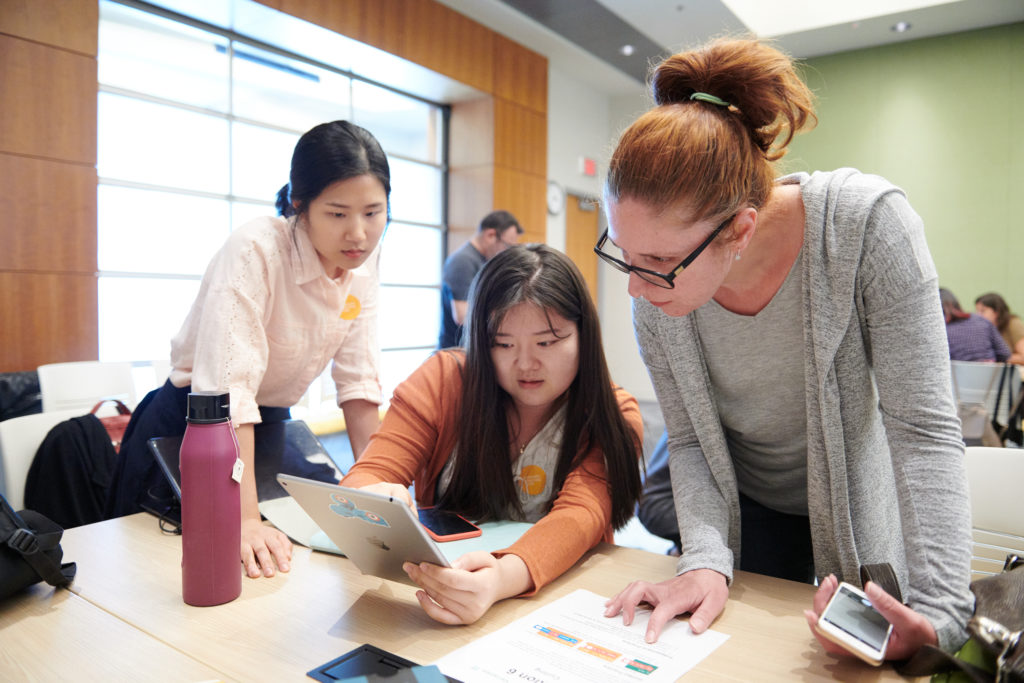Creating The K-12 Computer Science Framework
Technology is our future. More and more careers are generated in the technology sector and our students need to be prepared to live and even work in the technological world. Adults often think kids and teens know a lot about technology, but this isn’t always the case. Kids may be able to operate a cell phone, but they don’t know how to operate apps or programs that can help them learn or express themselves.
—Amy Gunn, Teacher, Dr Knox Middle School, Kelowna
Working in partnership with an advisory group to create the new K-12 Computer Science Framework, Canada Learning Code engaged with the best of the best from a broad range of stakeholders. We held workshops to pick the brains of industry leaders such as Microsoft, Amazon, and Google. We consulted with curriculum developers, educators, and teachers unions. We met with policy-makers and NGOs. And we reviewed computer science curricula across Canada, along with international computer science frameworks.
We also reached out directly to classroom teachers — those with computer science training AND those without — because we wanted to create a framework that was accessible to all, regardless of experience. They shared their valuable knowledge about what students need, as well as insights into what works — and what doesn’t work — in the classroom. We listened to their recommendations about the resources and supports they would require to implement the framework.

We took the best of what everyone offered and wove it together, creating a comprehensive computer science framework that prepares students in Canada for the future.
Building the K-12 Computer Science Framework — Step By Step
_
Fall 2018 — Gathering the Facts
As we conducted our initial consultations with technology experts to explore what students needed with respect to computer science education, we heard about inconsistent delivery across the country and challenges around accessibility. Ideas started to form, and we began collating our thoughts around creating a computer science framework for all of Canada.
Winter/Spring 2019 — Research and Development
Our team did a comprehensive scan and analysis of Canadian computer science curricula across the country and reviewed other well-known computer science frameworks around the world. We created an advisory group and gathered recommendations from 30 industry leaders in Canada and internationally.
From this, we built a vision. We began to identify what students need and the barriers they experience, such as access to technology. We looked at the gaps teachers face, like limited resources and time. We proposed guiding principles — such as integrating computer science education across subjects and from multiple perspectives — and articulated our values: computer science curriculum that is inclusive, solutions seeking, adaptable, and collaborative.
Finally, based on our discoveries, we recommended that computer science include five key components:
- Coding and Programming: building the skills kids need to write simple programs, debug them, and review their programs, as well as other programs, to identify efficient code and recognize poor code
- Computing and Networks: learning about both software and hardware, including file management, cybersecurity, and network connections
- Technology and Society: assessing what it means to communicate safely and ethically, and exploring how technology relates to the environment, history, law, and even well-being
- Data: understanding what data is and how it can be used and organized to tell stories and reach conclusions
- Design: being able to design things that are inclusive and accessible, taking into account the user’s journey
Summer/Fall 2019 — Engaging Stakeholders
Once we gathered our research and built our first working document, we shared our ideas with key stakeholders. We gathered feedback from policy-makers, industry experts, and teachers through online surveys and workshops. And the feedback was amazing! We also compared our initial work to five of the most well-respected computer science frameworks and the best examples of computer science curricula across Canada.
We integrated everything we learned and created a second working document. In this one, we introduced our five key components. We also proposed 23 computer science skills and competencies that we believe all students should acquire by high school graduation. And we proposed pathways to ensure a progression of learning.
Winter/Spring 2020 — Fine-Tuning the Computer Science Framework
The second working document has gone out for review. Through surveys and public engagement, we asked some key questions, such as:
- Have we got the five key components right?
- What’s missing?
- Are the progressions in learning that we’ve outlined realistic and the expectations at each grade reasonable?
We are currently collating the results!

What’s Next?
When the results are in, we will share with you some of the key findings from the second round of stakeholder engagement — and even more excited to launch the new K-12 Computer Science Framework in summer 2020!!!
UPDATE: we’re so excited to share that the K-12 Computer Science Education Framework is now available! Click here to learn more.
The educator in me has a passion for ensuring that what students learn in their classrooms is as relevant to their lives as possible. To be able to work on something like this is the epitome of that, and I’m so excited to help get it in the hands of educators across Canada.
—Anna Villanueva, Educator Programs Manager, CLC
We had quite an exciting journey creating this K-12 Computer Science framework and would not have been possible without the generous contributions made by our amazing partners, the Government of Canada!
Other Great Reads
-
Adapt to the new reality of work with free resources from Microsoft
In collaboration with: In today's job market, being able to adapt is the most valuable skill you can have. As AI, automation, and new technologies ...
-
Canada Learning Code and Skills4Good AI Launch National Partnership to Advance Responsible AI Literacy in Canada
New collaboration provides complimentary Responsible AI education and a national keynote to empower professionals in the Age of AI Canada Learning Code...
-
Desiree’s Win: A Mindset Shift, a Career Coach, and a Brand-New Role
When Desiree joined Career Collective, she was feeling stuck. A recent graduate in applied mathematics, she was navigating the challenges of the job marke...
